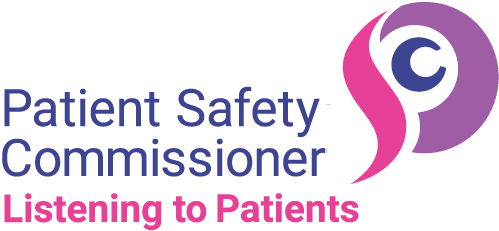PSC receives letter from the new Minister for Patient Safety on the Hughes report
 The PSC is pleased that, following her meeting with the new Minister for Patient Safety, she has received confirmation that the government is looking at her recommendations for redress for those harmed by valproate and pelvic mesh.
The PSC is pleased that, following her meeting with the new Minister for Patient Safety, she has received confirmation that the government is looking at her recommendations for redress for those harmed by valproate and pelvic mesh.
Dr Hughes said: ‘Understandably, patients have been anxious for an update following the General Election. I welcome that the work to produce a detailed response to the Hughes report is continuing under this new government.’
‘As I’ve said before, the most important thing is to listen to the views of patients. The only way to understand the devastating experience of harm is to hear from patients directly.’
‘I continue to offer my support to all government departments in their ongoing work to make progress on my recommendations. I expect a full response to be provided to patients at the earliest possible opportunity.’
PSC welcomes initial ministerial reply to Hughes report recommendations
The PSC has welcomed the initial response from the minister for patient safety to the Hughes report on redress for those harmed by valproate and pelvic mesh.
Dr Hughes said: ‘This letter shows that my report is not gathering dust on the shelf and that officials are working across government to produce a detailed response which we will receive in the summer.
‘I would encourage officials to continue conversations with patients who have all the detail about how difficult their lives are as a result of the harm they have suffered as it is only by working with patients that we can come up with effective solutions.
‘I look forward to seeing the full response before the summer. This has to lead to real change.’
Minister Caulfield writes that she is particularly keen to do what she can regarding the availability of information available to patients, as well as any improvements in access to the support patients are entitled to.
PSC launches redress options report
The PSC published her report on options for redress for those harmed by pelvic mesh and valproate on 7 February 2024. The report makes 10 recommendations to government on how to provide redress to those harmed.
The recommendations include the need for the government to provide comprehensive non-financial redress to those harmed and the creation of a two-stage financial redress scheme – formed of an interim scheme and a main scheme.
We want to thank all the patients who gave their time to support this work.
To view the EasyRead version of the report click here. Otherwise, click the button below.
Watch the event on our video below.


Frequently Asked Questions
Q: How can people register for the redress scheme that has been recommended to government?
A: The Commissioner is still awaiting the government’s response to the recommendations in the Hughes Report and no redress scheme has yet been set up. We received an initial letter from the government minister on 7 May 2024 but the government has not made any final decisions. The Commissioner will not be involved in the administration of any scheme and therefore cannot advise on registration.
Q: How do I know if I am eligible?
A: The Hughes Report discusses headline eligibility criteria on paragraphs 238 – 272 and it makes recommendations to government in relation to some eligibility criteria. For others, the PSC has presented options to government for it to make the final decision in line with our Terms of Reference. Also, if the government agrees to create a scheme, the scheme administrator will need to undertake detailed work with patients to create a clear set of guidance. Until the government and the scheme administrator have set out this information, it is too early to confirm if anyone is eligible or not.
Q: Who are the categories of people that you have recommended are eligible?
A: In the Hughes Report, we divided the harmed populations into two groups – the directly harmed and the indirectly harmed. We define ‘directly harmed’ in paragraph 239 of the report as:
- For valproate, individuals whose mothers were taking valproate at any point during their pregnancy.
- For pelvic mesh, patients who have been implanted with pelvic mesh to support pelvic organs for the treatment of stress urinary incontinence (SUI) or pelvic organ prolapse.
We set out further information about some of the words used in these definitions in the glossary of the report (Annex B).
These definitions were designed to align with the Terms of Reference and the findings of the earlier First Do No Harm review, chaired by Baroness Cumberlege. However, we heard evidence of harm that would not fall within these proposed definitions and the government has responsibilities to these patients as well. We define ‘indirectly harmed’ as those friends, families and loved ones of the directly harmed who have suffered emotionally, psychologically and/or physically as a result of the harm caused to that person (paragraph 247).This includes, for example, the mothers of those children harmed by valproate and the spouses of those women harmed by pelvic mesh. As with every aspect of the report, the final decision on eligibility rests with the government.
Q: What level of proof would be required for the recommended scheme?
A: Recommendation 7 of the Hughes Report states that:
‘Patients should find the application process for both the Interim Scheme and the Main Scheme straightforward, accessible, and non-adversarial.To support this, a presumption of truth should be embedded within the scheme, which would apply when assessing the evidence provided by patients to meet the eligibility criteria.’
As with all our recommendations, it is now up to the government to decide whether it will accept this recommendation.
Q: Will I have to produce medical records to access the scheme? What if I do not have these or I do not believe that my medical history was accurately recorded?
A: The Hughes Report discusses this in paragraphs 265 to 272 and states that we would expect the application process to be largely paper-based where the patient (or their authorised representative) grants access to the redress scheme to access the patient’s medical records, which it then uses to establish if they meet the eligibility criteria.
In more complex cases, such as where medical records are lost or patients wish to contest the content of them, we would expect the scheme’s caseworkers to assist.
Q: Is there a timeline for the government response to the recommendations?
A: The Commissioner received an initial reply to her report from Minister Caulfield on 7 May 2024. In this reply, the minister said that she will progress work across government to understand the relevant issues better and then provide a more detailed response to the PSC ‘in the summer’.
Q: Do the recommendations and report apply to Northern Ireland, Scotland, and Wales?
A: We discuss issues around devolved administrations at paragraphs 29 – 31 and 255 – 257 of the Hughes Report. We suggest the UK Government works with the Devolved Administrations on this, as the Commissioner’s role is limited to England.
Q: Has the government said they will implement a redress scheme for those harmed by pelvic mesh and valproate?
A: The Commissioner received an initial reply to her report from Minister Caulfield on 7 May 2024. In her reply, the minister said that she will progress work across government to understand the relevant issues better and then provide a more detailed response to the PSC ‘in the summer’.
Q: What will the Commissioner now do to make sure the government implements her recommendations?
A: The PSC expects the government to issue a full response to her report in the summer, as it has set out. The Commissioner remains in contact with government on redress and has made clear her expectations in terms of how this work should be progressed.
Q: I’m a harmed patient. What can I do to help progress the ongoing work by the government?
A: The 7 May 2024 letter from Minister Caulfield explains that work is ongoing across government on redress for those harmed by pelvic mesh and valproate. The Commissioner has encouraged the Department of Health and Social Care (DHSC) to engage with patients as part of this work, although she has no powers to compel them to do this.
The Commissioner encourages all patients to contact their local MP and the DHSC with their views on redress to ensure their voices are heard.
The project team
The Patient Safety Commissioner, Dr Henrietta Hughes OBE FRCGP, is working alongside a small, internal, project team on this work. Dr Sonia Macleod, Lead Researcher for the IMMDS Review, has also been appointed as an Expert Advisor for the work.
Register of interests of those working on the redress project (correct as of September 2023)
Dr Henrietta Hughes, the Patient Safety Commissioner
Dr Hughes has published a register of interests on the website under Advisory Group which she chairs. This covers the totality of her work as the Patient Safety Commissioner, including this project.
Dr Sonia Macleod
| Category/Name | Relevant interest (if any) |
|---|---|
| Current Employment | Advisor on the PSC Redress project |
| Appointments (voluntary or otherwise) e.g. trusteeships, directorships, local authority membership, tribunals etc | Vice-chair of Trustees and Director, The Crypt School, Gloucester (non-remunerated)
Director, DRSM Consultancy Ltd |
| Membership of any professional bodies, special interest groups or mutual support organisations | Member of Lincoln’s Inn (I am an unregistered barrister) (non-remunerated) |
| Any commercial/financial/legal connection or interest in the pharmaceutical and medical devices industry sector or any other body or organisation of interest to the Redress project
|
I run a research project on no-fault compensation for injuries due to covid vaccines at the Centre for Socio-Legal Studies, University of Oxford.
The project is funded by a grant from the International Federation of Pharmaceutical Manufacturers and Associations (IFPMA), whose members include Sanofi and J&J among others. This is an arms-length Grant Agreement has been assessed by the Oxford University Research Contracts Team. |
| Gifts or hospitality offered to you by external bodies and whether this was declined or accepted in the last twelve months | Guest of Luther Pendragon at the PR Week Awards 2023 |
| Any contractual relationship with the Redress Project and/or parties of interest | Appointed as Expert Advisor by Department of Health and Social Care |
| Any other interests that are not covered by the above | Appointed as a Special Advisor to the Health and Social Care Select Committee for its NHS Litigation Reform Inquiry and its IMMDS Review follow up one-off session (Dec 2021 – Jan 2023) |
Why are we doing this work?
The PSC’s remit is to promote the safety of patients and the views of patients in relation to medicines and medical devices.
In 2020, the Independent Medicines and Medical Devices Safety Review (IMMDS), chaired by Baroness Cumberlege, highlighted the avoidable harm caused by both pelvic and sodium valproate. It also set out the devastating impact on people’s lives when patients’ voices go unheard.
As a result of these findings, pelvic mesh and sodium valproate are two of the Commissioner’s three priorities for the year ahead. This redress project is part of the Commissioner delivering on these priorities.


